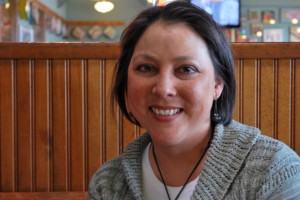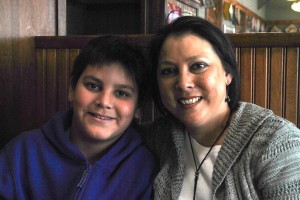By Molly Maher
Linda Parmiter has just celebrated her 57th birthday.
In June 2006 doctors had given her only one year to live after being diagnosed with stage IV melanoma.
This is just another day on the calendar to appreciate, she explained, every one being reason to celebrate. Still, this milestone has significance for her.
Its important to me because its one step closer to living as long as my mother, the Thornton resident said.
Having recently had a tumor-free scan at a follow up, Parmiter has fortunately become one of many cancer survivors today, with national mortality rates of cancer patients on a steady decline since the 1990s.
But, the battle for survivorship does not end with remission. Parmiter now faces insurance worries, a career change and long-term mental, physical and emotional side effects.
Parmiter was one of 13 cancer survivors who enrolled in Cancer Transitions at the University of Colorado Cancer Center. Participants were invited to six weekly sessions that address some issues patients face when transitioning between treatment and survival.
LIVESTRONG
Cancer Transitions is one of several survivorship offerings from the cancer center.
In 2005, the Lance Armstrong Foundation developed a Survivorship Center of Excellence network, giving funding to comprehensive cancer centers designated by the National Cancer Institute, said Alison Faust Jones, cancer survivorship program director.
The University of Colorado Hospital is one of eight centers appointed as a LIVESTRONG Survivorship Center of Excellence nationwide. It was selected through a competitive process and allotted up to $250,000 annually for a five-year period.
Jones said that this program offers the financial support necessary to test different models of support for survivors, and to facilitate the exchange of results among centers.
It was three years ago that we really started piloting clinical programs for patients after treatment is complete, said Jones.
Challenges for survivors
Though all experiences vary, Kristin Leonardi-Warren, survivorship program manager, said all survivors must answer the difficult question: What is my life now?
Typically one of the biggest things, she said, is that patients go from seeing their oncologists very frequently during treatment to getting minimal medical attention.
All of the sudden that comes to a halt, she said, Now, we only see the patient every three months.
Post-treatment is a time for survivors to find answers to that question of what their new reality will be, to reconcile their cancer experience and to set goals for their futures, she said.
All survivors must address the risk of future illnesses, from relapsed cancer to heart disease.
We try to refocus people at our clinics, Leonardi-Warren said. Youve survived, but lets not forget about the rest of you. Lets take care of your heart and your lungs.
Along with taking precautions, such as following a tailored diet and getting exercise to mitigate risk of illness, survivors must deal with the various side effects of treatment.
Leonardi-Warren said this frequently includes pain from surgeries and chemotherapy. Some patients experience neuropathy, or a loss of feeling or movement in a part of the body due to nerve damage. For some, the many medications prescribed to them post-treatment come with a cost, like weight gain.
Maia Rogers is in her fourth round of a battle with cancer, having had a 4 1/2-year remission experience before her breast cancer metastasized to her liver, putting her back into regimens of treatment.
Though still fighting her disease, Rogers had the experience of a survivor for nearly five years, and said that she experienced a number of transitional effects.
Rogers described the neuropathy she has in her fingers, making the tips numb and clumsy while turning pages.
For Parmiter, the worst of her transition to survivorship has been her chemo brain.
Chemo brain is a term used to describe a varied reduction in cognitive functioning, including decreased memory and reaction speed, as a result of chemotherapy drugs. It was not widely recognized in the oncology community until fairly recently, Leonardi-Warren said.
Parmiter described her frustration with this, having always been learner and independent. Not only has it been challenging to begin taking courses at college, having to study in a different way than she had before, but also daily life is filled with this change in functionality, she said.
I have flooded my house twice, she said. I am constantly setting alarms to remind myself of little things.
Rogers experienced some of these same frustrations, not being able to return to her work in public policy.
I wasnt as confident I could do it, she said.
Aside from these physical hurdles, patients often have emotional and relationship problems after cancer treatment.
For Rogers, battling cancer has led to a change in values and relationships.
You just had a life-changing illness, she said. What do you want to do with your time?
Her family is Rogers top priority, and fear of her daughter being affected by breast cancer is a large part of her transition, she said. That is one thing that motivated her to work at Susan G. Komen for the Cure before relapse.
You dont want anyone else to go through this, she said.
Fear may be only one emotion that cancer survivors experience.
Some people have psychological effects, we see a lot of people dealing with processing the fact that theyve had and survived cancer, Leonardi-Warren said. It can bring up all types of feelings, even PTSD [post traumatic stress disorder] they had from previous experiences in their lives.
Parmiter experienced an extreme low point post-treatment and eventually connected with a therapist at the cancer center.
When I crashed, I was desperate, she said. But he made me functional again.
Being your own advocate
Its a good thing Im a fighter, Parmiter said.
She was not talking about her many rounds of treatment or terminal diagnoses. She was referring to the obstacle to finding that therapist.
For people who werent aggressive enoughthey just arent getting it, she said of therapy or insurance support.
Cancer survivorship: The Numbers
- Number of survivors in 1971: 3.0 million
- Number of survivors in 2007: 11.7 million
In 2007, 64.8% of survivors lived at least 5 years after treatment.
Breast, prostate and colorectal cancers were most common types among survivors.
Rogers expressed the same feeling, noting that she benefited from her background working in public policy and health.
I was my own advocate, she said, using her experience to navigate insurance and seek information.
Both Parmiter and Rogers expressed frustration with a lack of funding, research and clinical trials for stage IV cancer patients.
For Rogers, she sees breast cancer patients of lesser stages receiving the majority of the support.
Its frustrating when women in the later stages are the ones dying, she said. When youre stage IV, you dont talk about surviving.
For Parmiter, finding a network of stage IV melanoma survivors has been nearly impossible, even having a doctor once saying her survival was surprising.
Its like theyre saying, Youre not supposed to be here, she said. But Im me, Im here, Im viable.
Parmiter has reached out to many programs including Cancer Transitions to make up for a lack of company in her survivorship.
Cancer Transitions
Of the 12 million cancer survivors in the United States, a majority will live at least five years after treatment. It was to help them address their post-treatment needs, that LIVESTRONG developed the Cancer Transitions program.
Cancer Transitions: Related stories
After 30 minutes of light physical activity, the weekly sessions address issues like nutrition and exercise plans, managing medical history and emotional stress-management.
Survivors really benefit from the group dynamic of Transitions, added Jones.
A lot of people, when theyre done with treatment, this is the first time they can really think about what has happened, she said. Having the opportunity to talk is just so helpful.
Parmiter, who attended all six sessions of the Transitions clinic, said that she most enjoyed connecting with other survivors.
I had a lot of validity of pains, of blond moments Parmiter said. Other people had that same experience.
Looking ahead
As a center of excellence, the University of Colorado Cancer Center qualifies for funding for next year, but it expects to receive it for more,Jones said.
As research into the effectiveness of survivorship programs advances, Leonardi-Warren said, the offerings available for survivors at the Cancer Center will only increase.
There are more and more survivors out there and people are really talking about what they need and how to get it, she said. Its hard sometimes because youre on that learning curve, but were miles ahead of where we were when I started as a nurse and we didnt even have a name for chemo brain.


